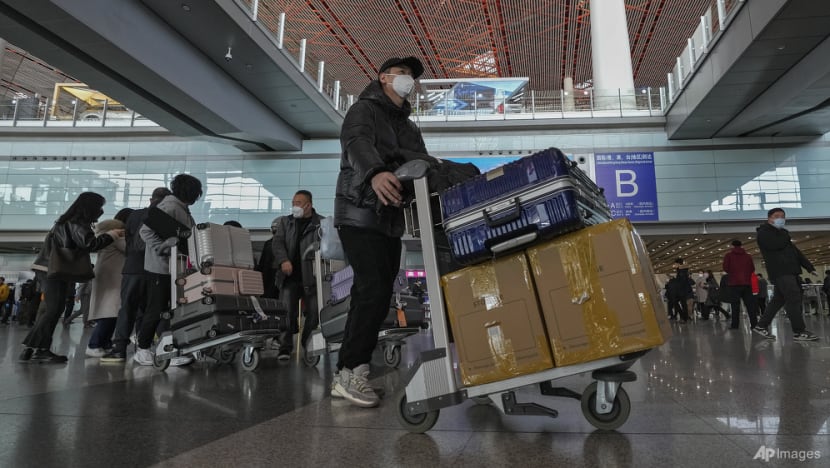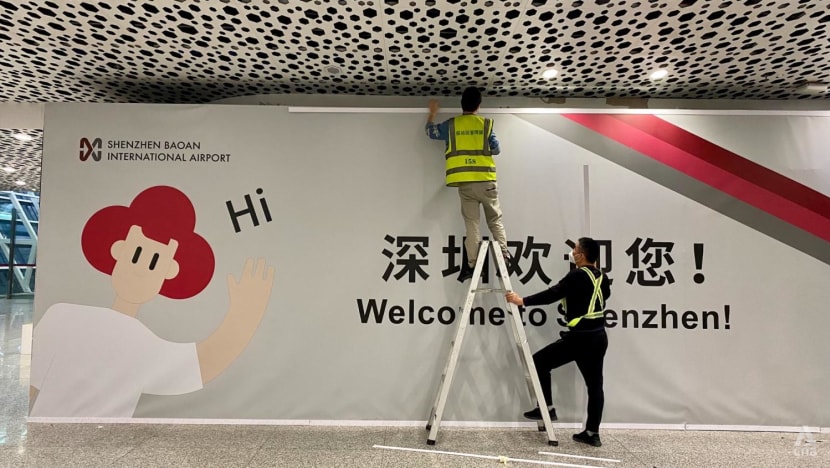China may take until mid-2023 to get to business as usual after relaxing border curbs

SHENZHEN: People looking to head into or out of China may have to wait until the middle of this year before travel returns to pre-pandemic normalcy, said industry players.
China reopened borders on Sunday (Jan 8), scrapping quarantine requirements and most travel restrictions which have isolated the country over the last three years.
It also started processing travel documents such as passports and visas for citizens, after discouraging non-essential outbound travel since the pandemic began.
But even as there is pent-up demand for overseas travel, many Chinese residents CNA spoke to are not in a rush to head abroad just yet.
Ms Jane Sun, the chief executive of China’s largest online travel platform Trip.com Group, said it could take some time for travel providers globally to ramp up to pre-pandemic levels.
“Airlines need to increase the travel routes back to 2019 levels, hotels need to open up as many rooms as possible. Local tour operators need to have the capacity to receive the customers into their region,” she added.
There are also uncertainties and inconveniences, as some countries have imposed COVID-19 requirements on Chinese travellers.
Ms Sun said travellers from China may avoid those destinations for now.
“So, we expect the first half of the year will still be in a transition period. The second half might (see) business (going) back to normal, compared to 2019," she added.

SURGE IN TRAVEL DEMAND
Searches for overseas hotels and flights surged in China, as soon as authorities announced it would relax COVID-19 travel restrictions.
According to data from Trip.com Group, search interest for outbound flights from mainland China rose by 83 per cent from Dec 26 to Jan 5, when compared to the previous two-week period.
The actual number of bookings increased by a more modest 59 per cent, with tickets for the upcoming Chinese New Year period going up significantly.
Top overseas destinations booked include Thailand, South Korea, Singapore, the United States, Japan, Australia and Canada.
For lifestyle blogger Liu Wenwen, travel had been a way of life before the pandemic hit three years ago.
The 39-year-old Wuhan native used to visit more than 10 countries each year and did travel-related content full-time.
“As a travel blogger, I panicked. I thought about how long the pandemic would go on for. It was a question mark. We couldn’t travel abroad,” said Ms Liu, who refocused her content on the domestic travel and the lifestyle market while waiting for China to reopen.
With the scrapping of strict restrictions, she now looks forward to travelling for work and leisure again.
Her top priority includes visiting Toronto and meeting her Canadian husband's friends and relatives in person for the first time, since they started dating during the pandemic and got married last year.
It will also be the first time in three years since her Chinese-born husband, Mr James Zheng, has been back.
“In the past three years, I was more worried that if I leave China, it would be more difficult for me to re-enter the country,” said Mr Zheng, a business owner, who has elderly parents living in Wuhan.
The couple is likely to travel only after the Chinese New Year or Spring Festival later this month, as they wait for the COVID-19 situation in the country to stabilise.
“We want to wait another month for the trend and change in the pandemic to become clear. We may feel more at ease when we go abroad,” said Ms Liu.
UNCERTAINTIES REMAIN
Limited international flights and sky-high airfares are another concern.
International flight capacity in and out of the country is operating only at 8 per cent of pre-pandemic levels, according to data from Variflight.
China’s aviation authorities aim to bring air travel traffic back to 75 per cent of pre-pandemic levels this year, as travellers look forward to more visits and reunions.
“With regard to air tickets, price is definitely a factor,” 34-year-old Gui Jingkang told CNA at the Shenzhen Airport.
“At the moment, fares are still very high in the short term, but I think it may flatten out in the long run."
There are also other uncertainties, with some countries like the US, Japan, Italy and Australia imposing new requirements for Chinese travellers amid rising infections.
Its abrupt relaxation of tough restrictions under its zero-COVID policy has led to the coronavirus sweeping across the country, with some estimates suggesting millions are being infected daily.
Beijing has denounced these measures, calling them unscientific or excessive, and has threatened to take counter-measures.
“There are many Chinese getting infected with COVID-19, and now Australia has issued some new policies,” said 22-year-old Lin Zedan, who returned to China on Sunday after graduating from a university in Sydney.
“So I am concerned that when I return, it will be very troublesome. But it’s still okay for now, as only a polymerase chain reaction (PCR) test is needed.”
RULES EASED FOR INBOUND PASSENGERS
Some travellers to China have welcomed the easing of time-consuming quarantine requirements and curb-free travel.
At the Shenzhen Airport on Sunday, many eagerly waited for their friends, families and colleagues at the international arrival hall, which had been put out of use over the last three years.
Previously, passengers arriving from overseas were typically ushered into a separate area to undergo mandatory COVID-19 tests, before being ferried to centralised quarantine facilities.
Among those who arrived on one of the first international flights into China as curb-free travel resumed was 31-year-old Liu Kaiyue.
The Chinese national, who works as a nurse in Singapore, was greeted by her husband just after midnight, who embraced her upon arrival.
The reunion has been more than half a year in the making, and is the first time the couple have seen each other in person since they found out they were expecting a baby.
“It feels good to be free. Really free,” said Ms Liu, who spent nearly a month in quarantine the last time she returned to China.
Others on the same flight also welcomed the relaxation of COVID-19 rules.
“I'm very excited because I haven't been back for three years,” said Mr Xia Wei, a China national who works in Singapore. The 28-year-old, who was travelling with his wife, was greeted by his parents-in-law.
“Our flight was actually scheduled to land before midnight, but it was delayed and it became the first flight (on Jan 8). We were quite lucky.”
At the airport’s departure hall, Ms Zhou Yiliang was sending off her 16-year-old daughter on a flight to Singapore, where she goes to school.
The farewell though, she said, felt different this time round, knowing that travel back to China is now much easier.
Ms Zhou hopes to visit her daughter for the first time in the near future, now that China has started processing travel documents and resuming outbound travel.
She said: “She is alone there without any relatives and may feel lonely, so she hopes for her mother to go and accompany her.”
















